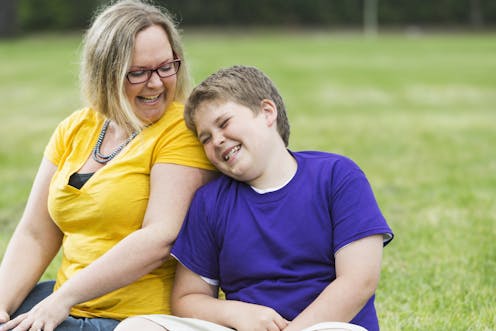Kids with obesity need acceptance from family and friends, not just better diet tips, to succeed at managing their weight
- Written by Amanda Harrist, Professor in Human Development and Family Science, Oklahoma State University

Hundreds of programs over the past four decades – from the removal of junk food from school vending machines[1] to Michelle Obama’s “Let’s Move[2]” campaign – have tried to get kids in the U.S. to eat healthier food and exercise more often.
But none of these efforts lowered national child obesity rates. In fact, child obesity has continued to increase[3]. This has been particularly true during the pandemic[4].
We think we know why. Most programs that seek to lower children’s body mass index, or BMI, focus on healthy food and physical activity. But as child obesity researchers who specialize in human development[5] and family science[6], we know that slimming down requires much more than attention to diet and exercise.
Those factors are important, but we found that acceptance from family and friends also plays a critical role in slowing the rate of weight gain for children with obesity.
To reach this conclusion, we collaborated with colleagues to follow almost 1,200 children in first through fourth grades in rural Oklahoma to find out more about the lives of kids who are overweight or obese. Our intervention programs allowed us to compare a traditional food and exercise approach to managing child obesity with approaches that also targeted the social and emotional aspects of children’s lives.
Family and peer acceptance
We conducted a randomized controlled trial in 29 Oklahoma schools[7]. More than 500 first graders who were at-risk for obesity – meaning their BMI was above the 75th percentile – were assigned to either a control group or a group that received a combination of three interventions.
These interventions focused on family lifestyle, family dynamics and the peer group.
[Explore the intersection of faith, politics, arts and culture. Sign up for This Week in Religion.[8]]
The family lifestyle intervention focused on healthy food and physical activity. Participants learned to use a color-coded food reference guide similar to this one[9] when selecting food. Parents tracked their children’s food consumption and physical activity, and also learned how to avoid conflict over food[10]. This conflict might involve arguing about how much the child is eating, whether the child can have dessert or whether the child has eaten enough of everything else on the table to get a second helping of a favorite food.
The family dynamics intervention added parenting skills[11] and healthy emotion management. Children’s emotion regulation and emotional eating[12] are significantly related[13], so teaching children to manage their feelings may reduce their tendency to eat when they are stressed out or upset. Children were taught how to deal with negative emotions, express their feelings and value their uniqueness. Parents were taught to value their children’s emotions, provide comfort and understanding, support children’s problem-solving and accept their children as they are.
The peer group intervention taught social acceptance in the children’s school classrooms. Our research has shown that the more children weigh, the more their classmates tend to dislike them[14]. However we’ve also demonstrated that we can decrease the rejection[15] that happens in elementary school classrooms by teaching children to be more accepting of one another.
Effect on obesity
We measured children’s heights and weights at the beginning of first grade and then after the intervention – in first, second, third and fourth grades. Only those children with obesity who received all three interventions – family lifestyle, family dynamics and peer group – had significant decreases[17] in BMI gains compared with the control group.
Ongoing analysis indicates that the peer group intervention was particularly important for children who were severely obese, with a BMI in the 99th percentile[18].
Our results show that to reduce BMI gains in the early school years, kids need more than healthy food and physical activity. They need parents who encourage their healthy choices and accept their emotions. Knowing you can come home and talk about how angry and sad you are is essential to healthy physical and mental growth. And children must also have friends and peers who accept them for who they are – regardless of how much they weigh.
References
- ^ school vending machines (www.usnews.com)
- ^ Let’s Move (letsmove.obamawhitehouse.archives.gov)
- ^ continued to increase (doi.org)
- ^ during the pandemic (www.cdc.gov)
- ^ human development (scholar.google.com)
- ^ family science (directory.okstate.edu)
- ^ 29 Oklahoma schools (doi.org)
- ^ Sign up for This Week in Religion. (theconversation.com)
- ^ this one (www.nhlbi.nih.gov)
- ^ how to avoid conflict over food (agris.fao.org)
- ^ parenting skills (digitalcommons.usu.edu)
- ^ emotional eating (www.health.harvard.edu)
- ^ significantly related (pubmed.ncbi.nlm.nih.gov)
- ^ tend to dislike them (www.doi.org)
- ^ decrease the rejection (doi.org)
- ^ kali9/E+ Collection via Getty Images (www.gettyimages.com)
- ^ significant decreases (doi.org)
- ^ BMI in the 99th percentile (www.cdc.gov)

















